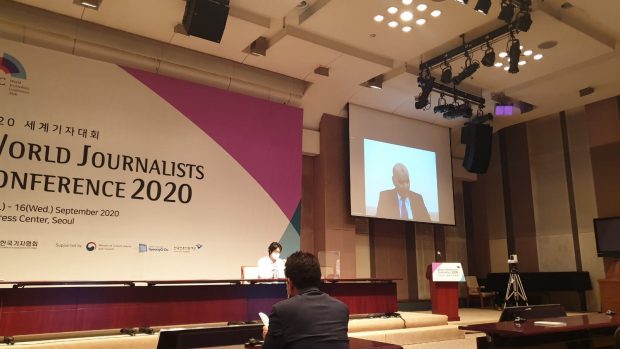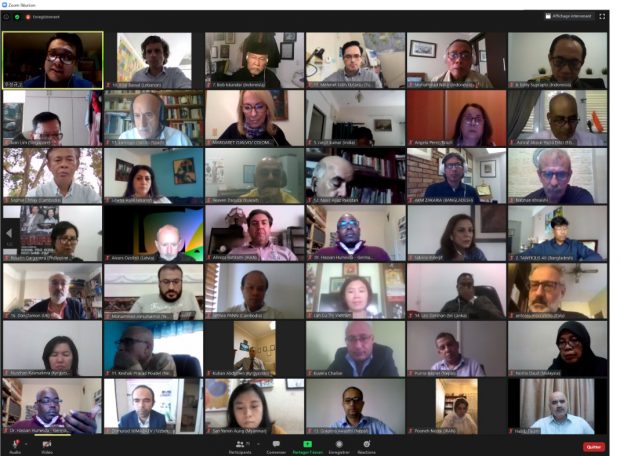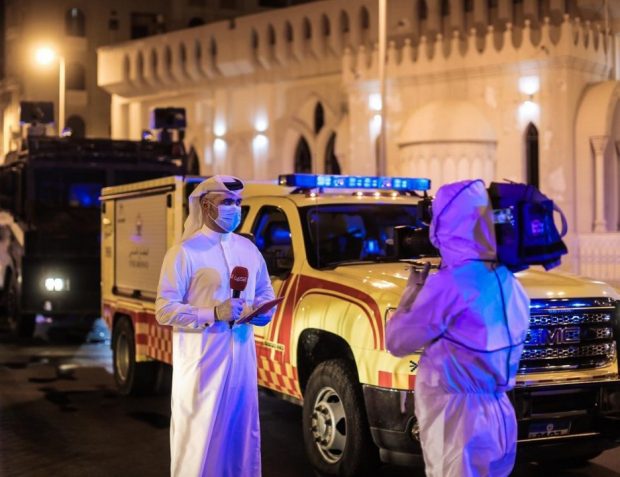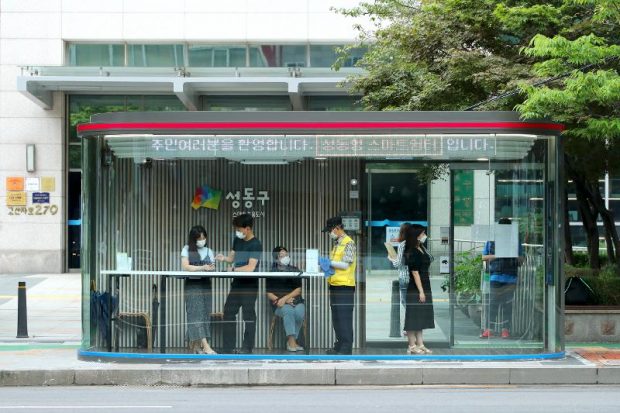Global responses to COVID-19: From optimistic uplifting to pessimistic grieving

Habib Toumi delivering his speech at WJC 2020 (Picture by Sang-ki Lee)
By Habib Toumi
BAHRAIN: When COVID-19 struck mercilessly, the world failed to respond promptly and decisively, except for a few countries. The lack of preparedness compounded by stubbornness to view COVID-19 as a deadly virus that would not go away quickly were among the reasons that led to catastrophic results across the globe.
In its eighth edition, the World Journalist Conference this year (WJC 2020) brought together dozens of journalists from across the world and health experts mainly from Korea to discuss how different countries reacted to the spread of COVID-19.
Global responses to the virus was among three themes tabled by the conference held annually by the Journalists Association of Korea (JAK).
The other two themes were fake news and the future of journalism that was reviewed on the first day of the conference and peace policy on the Korean Peninsula discussed on the third day. Korea this year marked the 70th anniversary of the Korean War that sliced the peninsula into South Korea and North Korea and divided families.

A section of the participants (Picture by Bilal Bassal)
Below is my speech at the conference:
“At last year’s conference, we paid tribute to all the innocent victims of terrorism. We did not know that in 2020, the world’s top enemy would not be terrorism, but a tiny virus that has killed close to one million people and infected almost 30 million people. These are terrible numbers and at this age of unprecedented technological and scientific advances, even much smaller numbers of cases and deaths are unacceptable.
How prepared was the world to deal with the COVID-19 pandemic?
The world was not prepared as shown when the virus tested the ability of governments to take action.
The media was not prepared either to counter the toxic disinformation and misinformation” that used volume, speed and people of influence to become as dangerous as the virus itself.
As each government had its own considerations and views for the most appropriate ways to deal with the virus, it became obvious there would be no universal response to the coronavirus. The following days, weeks and months proved, while some countries leapt into action, others were still denying the virus was a real threat.
In recent years, the world has witnessed and suffered from several epidemics – SARS, MERS, Ebola, H1N1 flu, Zika … They all painfully showed how new and reemergent pathogens could spell disaster and kill people.
Countries that learned the lesson adopted, since the pandemic began, policies to mitigate the spread of the coronavirus and to reduce its impact on their population, the economy, politics and ways of life.
Others were not so serios about it, often misguided by “experts” believing they know it all, religious leaders believing they had divine protection and politicians believing they are smart and powerful and possess a healthcare strong enough to deal with the virus.
So how was the global response to COVID-19?
I will mention examples from the best and worst groups in the global response to COVID-19.
In the first group, the national focus was on the population’s safety, dignity and right to remain afloat during the sharp economic downturn and on how people readily cooperated and complied with the precautionary measures.
This means closing schools, nonessential businesses and borders, banning events, requiring facemasks, telling people to stay at home and providing answers and solutions.
In this group, I will cite the case of Bahrain.
Bahrain took the virus seriously and went for advanced preventive measures based on expert opinions, trust and open communication.
Bahrain involved all people in the fight. Everyone was a member of the large team. It used technology for monitoring and tracing cases.
Bahrain set up quarantine centers to limit the spread of the virus.
The centers were not prisons, and patients enjoyed medical care and facilities to feel at ease. For example, they had five meals a day, games, food and drinks around the clock. It leveraged technology for tracing.

Bahrain Television journalist Yahya Al Omari on a COVID-19 assignment
Bahrain confronted fake news without complacency. People who circulated fake news were referred to justice for prison or fines or both.
Journalists had training sessions on how to work in COVID-19 hospitals and quarantine centers, on how to talk to doctors and patients and on how to act whenever they are under personal pressure.
Bahrain launched radio and TV programs in many languages and held street campaigns to reach out to everyone. There was NO reported abuse of human rights.
Journalists played a major role in the success of the campaigns, thanks to their high sense of responsibility.
In this group of successful countries, I can also mention South Korea, Singapore, New Zealand, Vietnam, China, Tunisia, Japan …

Commuters wait for buses at a “smart shelter” high-tech bus stop in Seongdong-gu District, Seoul. South Korea has often cited internationally for its use of technology to fight COVID-19 (Seongdong-gu District)
Korea’s success factors included having a well-prepared plan to respond to infectious diseases. It included enlisting the private sector in facilitating responses to the virus, a robust health system, an advanced ICT infrastructure, a high civil responsibility and clear and regular communication from the government, holding two conferences a day.
Now, in the negative group of global responses to COVID-19, we have a different story. A very sad story.
These countries took anti-science approaches, driven by political, religious, and economic calculations. They did not listen to expert advice. They failed to protect the weak, the old and the poor.
Countries failed because they adopted anti-science approaches and tactics away from expert advice. They were driven by political, religious, social and economic reasons and calculations. They failed to protect the weakest people and minorities.
Political leaders thought they were smart and strong and could beat the virus easily.
Religious leaders thought they had divine protection. In fact, excessive religious zeal was a factor in spreading the disease with believers refusing to conform to the precautionary measures and crowding sanctuaries.
In other cases, restarting the economy was much more important than disease control and concern about overwhelming the health system was a priority even if it meant the death of senior citizens.
The tragic stories about the deaths of the elderly and the weak in care homes will haunt the world forever.
It is the duty of states to provide human communities, regardless of their age and racial, social or religious backgrounds with the means to protect themselves from this and other viruses.
In the longer term, the new world will somewhat recover from the COVID-19 calamity. While some countries will joyfully celebrate their success in dealing with the pandemic, others will have a hard time dealing with the scars left on their communities. They will have to explain how they failed to understand that with wise policies and true compassion, the health of the people and the health of the economy are not in conflict.
Looking forward to the next World Journalists Conference in 2021 with COVID-19 out of this world.”

























































